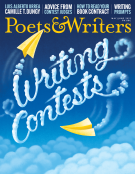U .S. Supreme Court decisions on policing, Joseph Conrad’s Heart of Darkness, death certificates, physics textbooks, property labels on books. In their debut poetry collection, I Am the Most Dangerous Thing, published in May by Alice James Books, Candace Williams reshapes all of these texts to reveal their underlying premises about power. Through erasures and forms that rely on repetition—such as the ghazal and Bop, a form created by poet Afaa Michael Weaver—Williams critiques capitalism and racism, documenting the realities of being “a poet exhausted and hurting from truth” while also celebrating moments of rest and queer love in poems that are formally dynamic, direct, and observant. “I have a voice / that cannot be / silenced,” writes Williams. “[B]etween whiles / I had to look / for the queer // patterns: witchcraft / full knowledge / transparent thirst.”

Candace Williams, author of I Am the Most Dangerous Thing. (Credit: Laimah Osman)
Several of Williams’s poems are set in New York City and developed during workshops they took there with the nonprofits Cave Canem and Brooklyn Poets. In 2016 they published “MEMO:,” satirizing corporate culture, in No, Dear, which features poetry by writers living in the five boroughs. No, Dear publishes twice a year as a slim, themed volume: “One can read it in a single bathroom visit or a day’s commute,” write the editors. “Their hand-sewn editions are beautiful,” Williams says. “And I love their approach to community-building.” No, Dear emerged from an informal poetry workshop in late-aughts Brooklyn, and the editors prioritize strengthening artistic connections and decentralizing editorial power: A poet previously published in No, Dear guest-edits every issue, and the contributors of each installment attend a launch reading, collaboratively curate a separate reading, and interview one another for publication on the journal’s website. Submissions are currently closed.
After reading Morgan Parker’s poem “MATT” in a 2015 issue of Sixth Finch and admiring editor Rob MacDonald’s curation and pairing of poetry with visual art, Williams felt inspired to submit to the online quarterly. A recent issue of Sixth Finch, for example, includes a photo of one of Cara Barer’s colorful book sculptures alongside two surreal poems by Lauren Shapiro and an uncanny still-life painting by Erin K. Wright that depicts a chess board, miniature houses, and peach slices. After publishing two poems with the journal, “THIS BOOK IS THE PROPERTY OF” and “Black Sonnet,” Williams went on to participate in a Sixth Finch reading and contribute poems to its tenth anniversary issue in 2018. Submissions are currently closed.
Throughout I Am the Most Dangerous Thing, Williams plays with the language of science and economics to critique how systems such as capitalism quantify human value in terms of labor. Williams published one such poem, “Principles of Value,” alongside the love poem “Quanta,” in Bennington Review. Edited at Bennington College in Vermont and published twice a year, Bennington Review features poetry, fiction, nonfiction, translation, film writing, and cross-genre work. “In the spirit of poet Dean Young’s dictum that poets should be ‘making birds, not birdcages,’ we are particularly taken with writing that is simultaneously graceful and reckless,” write the editors. Last year the review won a literary magazine prize from the Whiting Foundation, with the judges citing its editorial vision as “razor-sharp and whimsical.” Submissions will open on November 15.
Many of the poems Williams published in journals stem from their engagement with artistic communities. While living in New York City, Williams was commissioned to write a poem on climate justice for an event organized by artist Modesto Flako Jimenez’s arts nonprofit, Oye Group. The resulting prose poem, “blackbody,” considers climate change and race by examining the physics behind light absorption. Williams eventually published that and two other poems in the poetry journal Prelude at the invitation of coeditor Stu Watson, who heard Williams give a reading in 2016 in Brooklyn. Appearing online quarterly and in print annually, Prelude has featured more than six hundred writers since releasing its first issue in 2015. The editors also occasionally publish books, including titles by Anthony Madrid, Jason Koo, and Lindsay Turner. Submissions are open via Submittable.
Williams used to submit to journals featuring writers they admired but now tends to send work only if solicited. When the online journal Wildness solicited Williams, for example, the poet sent “Panther Gets Loose,” an erasure of a New York Times article about a panther that escaped from the Bronx Zoo in 1902. The poem appeared alongside fiction by Cameron Green, nonfiction by Brianna Albers and Steffan Triplett, and an interview with Maggie Nelson. The editors of Wildness note that they gravitate toward nature- and place-based writing, citing journals such as Thrush, the Adroit Journal, and the Offing as inspiration. Housed by British publisher Platypus Press, Wildness is currently closed for submissions.
Dana Isokawa is a contributing editor of Poets & Writers Magazine and the editor in chief of the Margins.








